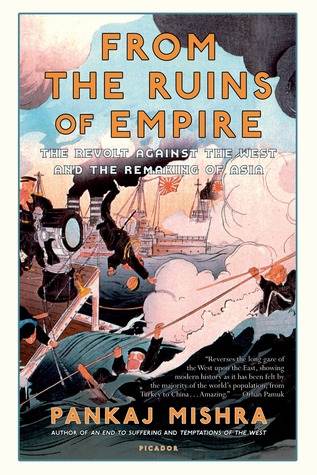
From the Ruins of Empire
The Intellectuals Who Remade Asia
کتاب های مرتبط
- اطلاعات
- نقد و بررسی
- دیدگاه کاربران
نقد و بررسی

Starred review from June 25, 2012
Indian-British historian and international affairs commentator Mishra (Temptations of the West) looks at how, between about 1870 and 1940, “some of the most intelligent and sensitive people in the East responded to the encroachments of the West (both physical and intellectual) on their societies.” In particular, he focuses on Jamal al-Din al-Afghani and Liang Qichao, intellectuals and political activists. Born in a small town in Iran, al-Afghani was the ultimate Islamic cosmopolitan, living for periods of time in Delhi, Kabul, Istanbul, Cairo, Tehran, London, Moscow, and Paris. Ultimately, al-Afghani anticipated today’s Islamists as “the first thinker to see the concepts ‘Islam’ and ‘the West’ as violently opposed binaries.” Chinese thinker Liang insightfully criticized the Western imperialism that devastated much of Asia well into the 20th century, favored Japanese authoritarianism with a modernist bent over American democracy (with its racism and corporate domination of the electoral process), and remained a believer in Confucianism to the end of his life. Mishra looks more briefly at a third figure, the Bengali philosopher and writer Rabindranath Tagore, and such individuals as Ho Chi Minh and the pre-Khomeini Iranian Islamist Ali Shariati make “cameo” appearances. Well-researched and crisply written, this scintillating work will help American readers understand the political and intellectual roots of Islamism and other non- and anti-Western thought in Asia today. Agent: Amanda Urban.

July 1, 2012
A widely researched, ambitious study of several important early agitators against Western domination in India, China and the Muslim world. Mishra (Temptations of the West: How to Be Modern in India, Pakistan, Tibet, and Beyond, 2006, etc.) asserts that the intellectual and political awakening of Asia as it moved into the modern world forms one of the great themes of the 20th century. The author touches on defining historical moments in terms of galvanizing Asian self-consciousness and nationalism--e.g, Napoleon's invasion of Egypt, the Indian Rebellion of 1857, the Boxer Rebellion, the Russo-Japanese War, the founding of Turkey on Ottoman ruins and Woodrow Wilson's Fourteen Points. Mishra focuses mostly on three thinkers in the Asian world less well-known than Gandhi or Mao, but whose ideas and writings influenced them hugely. They include Persian-born Jamal al-Din al-Afghani, who developed a virulent hatred of imperial powers while moving among Afghanistan, India, Turkey, Egypt and Persia, stressing the need to form a Pan-Islamic front to resist Western incursions; Liang Qichao, a reform-minded journalist who escaped from arrest in China and found in cosmopolitan Japan a refuge and model for resistance and national survival; and Rabindranath Tagore, a Bengali who founded experimental schools and preached rural harmony against urban aggressiveness, rejected "mindless imitation of the West," and urged Eastern spiritual wisdom as a replacement for Western venality. All well-traveled, these thinkers observed the West's moral bankruptcy, such as America's treatment of blacks, huge inequality in wealth and restriction of immigration to Japanese, and developed a transformation of consciousness. They were critics of the West, "revitalizers of tradition" and often religious purists, and their ideas would catch fire in such avenues as the Iranian Revolution of 1979 and modern Salafism. A perfect springboard for many necessary ideas and historical characters to be studied in depth.
COPYRIGHT(2012) Kirkus Reviews, ALL RIGHTS RESERVED.

August 1, 2012
Western colonialism may be finished, but there is continuing fascination with its history. Mishra's interest in it settles on Asian intellectuals who opposed the European powers, in particular, Jamal al-Din al-Afghani (183897), Liang Qichao (18731929), and Rabindranath Tagore (18611941). Depicting them and other thinkers wrestling with modernism's disruption of traditional societies, Mishra traces their evolving ideas for accommodating or rejecting Western influence. Al-Afghani was an early exponent of reviving Islam as a counterforce to the temptations of liberalism; promoting the cause and excoriating the West took him from Persia to India to Cairo and Istanbul. As for Liang, a scholar involved in the politics surrounding the overthrow of the Qing dynasty in 1911, liberal democracy would not do for China; he favored authoritarianism to redress his country's plight. Spiritual revival was also the substance of Tagore's anti-Western advocacy, a proposition Mishra shows being superseded by imperial Japan's conquests of 194142. Concluding with a postwar tour of Islamic ideologues, such as Sayyid Qutb, Mishra's survey knowledgeably presents an intellectual history of anti-imperialism.(Reprinted with permission of Booklist, copyright 2012, American Library Association.)

























دیدگاه کاربران